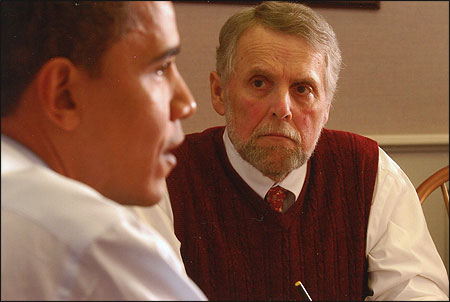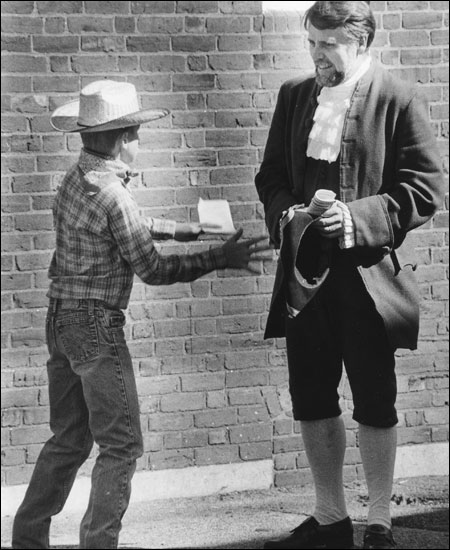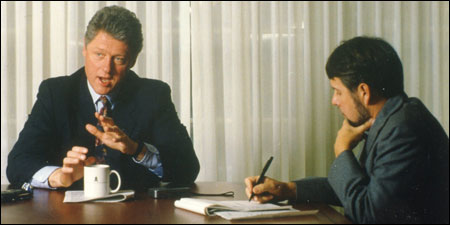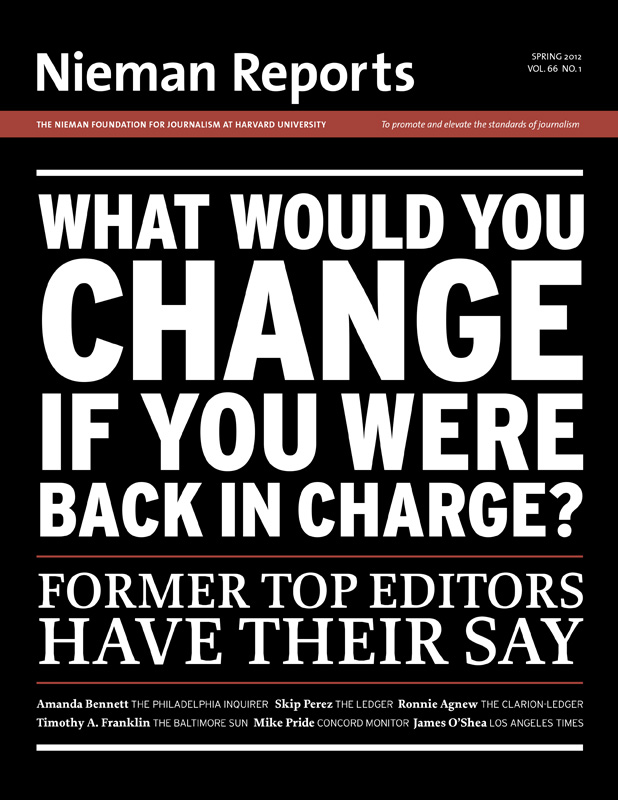
Concord Monitor editor Mike Pride interviews Barack Obama before the 2008 N.H. presidential primary. Photo by Dan Habib/Concord Monitor.
The Concord (N.H.) Monitor still shows up on my doorstep each day. I read the local news. I follow with dismay the Republican reactionaries the voters elected to the New Hampshire Legislature in 2010. I read the obits. I read the news from City Hall and the business community. I read about sports and local culture. I read the editorial page. I pretend nothing has changed while knowing it has.
The Monitor is a small paper—with a circulation well under 20,000 after a decline of 15 to 20 percent during recent years—but its task is large. It covers the city of Concord, more than 20 towns (each with a distinctive personality and history), a 424-member Legislature, many state agencies, and, every four years, the nation's first presidential primary.
Since I left the Monitor in 2008 after 25 years as editor, severe cuts have been made to keep the paper solvent. The cityside reporting staff has fallen from 15 to 8.5 members. The staff remains as skilled and committed as ever, but even without new duties as bloggers, tweeters and breaking news Web writers, it is too small to cover the community.
A community newspaper, with its flexibility and closeness to readers, is the ideal place to lead the revolution in online journalism, but I retired in part because I was not the person to direct that crusade. If I were starting a community paper in Concord today, my first hire would be a savvy person who would make smart online news delivery a top priority. After that, every idea I hatched and executed would be aimed at restoring and enhancing local news reporting.
I would make significant changes in the newspaper's content and how it is gathered. The main ones would be in the sports and photo departments.
There would be no sportswriters per se on my staff. I'd merge production of the sports pages into a universal desk and move the sportswriters to the news side. Of course, the paper would often use their talents to cover big local sports events and write sports features, but most of their time would be spent reporting the news.
What about the rest of sports? We would buy coverage of Boston pro sports, the University of New Hampshire teams, and other regional sports but leave coverage of most national and international sports to other websites.
We'd expand local sports coverage, mainly using the Web. This would require even greater use than the paper now makes of sports stringers, call-ins and e-mails from local high schools and league officials. The Monitor would be the place for people to turn for comprehensive coverage of everything from small-fry soccer to statewide high school sports to community hoops and softball teams. This would require great care in updating scores, standings and schedules and close contact with the local sports community.
When I was editor, visiting groups of high school students often told us they read our sports pages each day to see what their friends and acquaintances from other schools were doing. If the paper did an even better job online of covering school sports, it might attract more young readers.


The Concord Monitor blends community journalism and a national voice. Top: Editor Mike Pride as a colonial publisher. Bottom: With Bill Clinton before the 1992 N.H. presidential primary. Photo by Gayle Shomer/Concord Monitor (top); photo courtesy of Concord Monitor (bottom).
The changes I'd make to the photography department would be similar to the ones in sports. The Monitor has a fine tradition of doing in-depth photo projects, including one that won a Pulitzer Prize. But to fulfill the paper's daily photo demands while also doing such projects requires a larger staff than the Monitor can now afford. I'd start using photos taken by readers. Everyone now has a camera so amateur photojournalists are everywhere.
My Monitor might have one full-time photojournalist and one full-time intern. The photo editor would enlist the public to cover the community—sports, breaking news, nature, features—in pictures. The main vehicle for presenting these photos would be the online Monitor, where content would be updated as often as possible. The best photographs—and I believe the paper would get high quality from local amateurs—would grace the front page and other section fronts of the print paper.
Managing reader-produced content presents challenges, but there is a precedent for it at the Monitor. The opinion pages already have a rich abundance of local and state commentary. The goal would be to enlist the public in expanding local sports and photography while reducing the role of professional journalists in these areas.
I'd institute two other changes—one a slight modification, the other a major shift. The modification would be to step up the sharing of local and state news with other newspapers around the state. The Monitor already does more of this than ever but not as much as it should. There is nothing glamorous about digesting and aggregating stories written by other newspapers. Yet in a far-flung but community-minded state like New Hampshire, a crisp, comprehensive state news report is important. It is also a useful antidote to the if-it-bleeds-it-leads mentality of statewide commercial television.
The major shift I'd make would be to abandon extensive wire coverage of world and national news. The Monitor has provided this for decades, and there are still times when such news dominates a day's events and should dominate the front page of the printed paper. But the effort and expense of putting together a full daily wire report are wasted in an era when readers have many timelier and better sources of such news at their fingertips.
The Monitor's overriding purpose is to provide state and local news so that readers can know each other, identify challenges and solutions, and make informed decisions. Of our institutions, only a local newspaper can serve democracy in this way. To do this the paper needs a staff of smart, skilled reporters—a staff big enough not just to cover a large area but to dig deeply into local and state issues.
RELATED ARTICLE
“Empty Nest Syndrome”
- Mike PrideIf I were starting the Monitor today, every action I took would be aimed at enhancing the paper's ability to report local news. The time may come when the Monitor should sell its press and commit exclusively to online journalism. If it does, the paper's reason for being will be no different from what it has always been.
Mike Pride, a 1985 Nieman Fellow, was editor of the Concord (N.H.) Monitor for 25 years. He still writes for the paper and is working on his sixth book, a history of New Hampshire during the Civil War.



